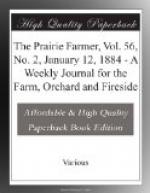I faintly remembered seeing his white, horrified face peering around the barn at the horses. I noted the visitors ate little—the food seemed to choke them. Some of them watched Mary and the baby in a queer sort of way. When Jack, as was his custom, kissed his wife and babies good-by, one of the visitors, an oldish man, coughed huskily, and said: “Blest if I kin stan’ this.” They all rode off, Jack the merriest of all, waving his hat till he was out of sight.
When we were clearing up the unusual quantity of dishes, Yik Kee appeared at the end window and beckoned me. I followed him out. Ted was with him. Behind the barn were the three horses saddled. Shep was with them, released from confinement, where he had been secured from following his master.
“Foller ’em,” said Ted in an excited whisper. “Yik’s afraid they’re up to something.”
“What is it, Yik?” I said, sternly. “No fooling now.”
For answer he twisted his long pig-tail around his neck, tying it under his left ear in a significant manner.
“Hump, he hangee; stealee cow.”
“Oh, Mary,” I sobbed, remembering Gil Mead’s visit, and his strange actions, and dimly seeing what Yik Kee meant, “I must tell Mary,” I said, wildly.
“Hump, no,” said Yik Kee. “Yellee sick,” and he closed his eyes in a die-away sort of manner. “Go now—too latee.”
We mounted.
“Mother’ll think we’re gone to ride,” said Ted, as we galloped over the plains. He was deathly pale, poor little fellow, but he sat erect and firm. I saw his father’s big Colt’s revolver sticking out of his pocket. He was a determined boy. Even in my despair, in my wild hope that I could save Jack by begging on my knees, that I could cling to him, that they would have to kill me first, I could not help a smile at the comical figure Yik Kee presented on horseback. His loose garments flapped in the wind, his long pig-tail flew out behind, and he bobbed up and down like a kernel of corn in a corn-hopper.
It was a soft, warm night, lighted only by the pale young moon and the twinkling stars. We rode as fast as our horses could gallop. Shep was close at our heels. Way ahead, when we reached the top of a little hill, we saw the crowd of horsemen. They were riding toward Denver. We galloped on with renewed zeal. They turned into a cross road leading to Mead’s ranch. On this road was a bridge over Dry Gulch, which was in the spring a roaring torrent. Beyond the bridge, across the fields, was the hay-stack of Mead, where was stored sufficient to feed his domestic cattle through the winter. We at last reached the turn in the road. They were three miles in advance, riding rapidly. Yik Kee stopped at the turn. “Hump! Can’t catchee. Hangee at bridge. You goee!” He turned his horse and sped across the field, deserting us basely.
We rode on, Ted and I. He was pale and still; my cheeks were burning. We neared the bridge. The high mound of earth before us hid us from sight. We stopped our horses and listened. The men had lighted torches, some were preparing a rough gallows under the bridge; two were uncoiling rope; some held the horses of the others beyond the bridge. The men were masked now, and I could see by the lighted torches that this number was increased. Jack was very white and sad, but he showed no fear.




